2018 下半年上海教师资格初中英语学科知识与教学能力真
题及答案
一、单项选择题(本大题共 30 小题。每小题 2 分,共 60 分)
1. Which of the following underlined parts is different from others in pronunciation?
A. wished
B. jumped
C. kissed
D. waited
2. Which of the following shows the general intonation pattern in a complex sentence?
A. When I started my↗career there was no↗unemployment.
B. When I started my↗ career there was no↘ unemployment.
C. When I started my↘career there was no ↗unemployment.
D. When I started my↘ career there was no ↘ unemployment.
3. All the_______in this school are taught by the same teacher.
A. six-year-olds
B. six-years-old
C. six-year-old
D. six-years-olds
�
4. The risk of infection for that patient hasn't diminished after the
operation._______, it has increased.
A. On the whole
B. On the contrary
C. On the average
D. On the other hand
5. Testing is still a usual means_______which students' progress is measured.
A. in
B. at
C. of
D. by
6. Many people_______in the project at both research and editing stages and we would
like to thank them all here.
A. have involved
B. have been involved
C. having involved
D. having been involved
7. Only until very recently_______possible that grammarians are able to make
accurate statements about the rules of some languages.
�
A. has it been
B. it has been
C. was it
D. it was
8. This is not_______they had expected after years of painstaking research.
A. a result as bad as
B. as a result as bad
C. as bad as a result
D. as bad a result as
9. Which of the following words is formed through derivation?
A. Students.
B. Shorter.
C. Bought.
D. Insanity.
10. The utterance “Now, correct me if I'm wrong ...”suggests that people are likely
to observe
the_______Maxim in daily conversations.
A. Quantity
B. Quality
�
C. Relevance
D. Manner
11. When a teacher asks students to brainstorm what they will write about an
unforgettable trip,he/she mainly focuses on_______.
A.
ideas
B. layout
C. style
D. feedback
12. Which of the following is a communicative task?
A. Reading aloud the dialogue on page 24.
B. Writing a party invitation to your Mends.
C. Translating the first paragraph into Chinese.
D. Making sentences with the expressions given.
13. What is being practised if a teacher asks students to read words like "cot, hot"
and "dog,log"?
A. Spelling and structure.
B. Stress and sound.
C. Minimal pairs.
D. Phonetic symbols.
�
14. What teaching method is used by the teacher if much of his/her class time is
spent on
drilling sentence patterns followed by exercises like repetition,
memorization, mimicry, etc.?
A. The Natural Approach.
B. The Communicative Approach.
C. The Audio-lingual Method.
D. The Grammar-translation Method.
15. According to the affective-filter hypothesis,_______is NOT an affective
factor
influencing language learning.
A. attitude
B. motivation
C. interest
D. intelligence
16. What does his/her feedback focus on if a teacher's comment is “John, it would
be much
better if you have given more details,t” ?
A. Content.
B. Language.
C. Attitude.
D. Aptitude.
�
17. Which of the following is a referential question?
A. Where was Yang Liwei born?
B. Who is the first Chinese astronaut?
C. Why do you think Yang Liwei is a great astronaut?
D. When did Yang Liwei begin his historic space travel?
18. Having lived in China for a long time, John could fully understand the cultural
shocks
experienced by his Chinese students. Which of the following traits does John
have in this instance?
A. Avoidance.
B. Empathy.
C. Extroversion.
D. Introversion.
19. When the teacher asks students to read a text for the main idea, he/she intends
to develop
students' skill of_______.
A. retelling
B. predicting
C. skimming
D. scanning
20. Which of the following is based on the communicative view of language?
�
A. Structural syllabus.
B. Skill-based syllabus.
C. Genre-based syllabus.
D. Functional-notional syllabus.
请阅读 Passage 1,完成第 21-25 小题。
Passage 1
There are two kinds of motive for engaging in any activity: internal and instrumental.
If a
scientist conducts research because she wants to discover important facts
about the world, that's an
internal motive, since discovering facts is inherently
related to the activity of research. If she conducts
research because she wants
to achieve scholarly renown, that's an instrumental motive, since the
relation
between fame and research is not so inherent. Often, people have both for doing
things.
What mix of motives--internal or instrumental or both--is most conducive to success?
You
might suppose that a scientist motivated by a desire to discover facts and by
a desire to achieve
renown will do better work than a scientist motivated by just
one of those desires. Surely two motives are better than one. But as we and our
colleagues argue in a paper newly published in the
Proceedings of the National
Academy of Sciences, instrumental motives are not always an asset and
can actually
be counterproductive to success.
We analyzed data drawn from 11320 cadets in nine entering classes at the United
States
Military Academy at West Point, all of whom rated how much each of a set
of motives influenced
their decision to attend the academy. The motives included
�
things like a desire to get a good job later
in life and a desire to be trained
as a leader in the United States Army.
How did the cadets fare years later? How did their progress relate to their original
motives for
attending West Point?
We found, unsurprisingly, that the stronger their internal reasons were to attend
West Point, the
more likely cadets were to graduate and become commissioned
officers. Also unsurprisingly, cadets
with internal motives did better in the
military (as evidenced by early promotion recommendations)than did those without
internal motives and were also more likely to stay in the military after their
five
years of mandatory service.
Remarkably, cadets with strong internal and strong instrumental motives for
attending West
Point performed worse on every measure than did those with strong
internal motives but weak
instrumental ones. They were less likely to graduate,
less outstanding as military officers and less
committed to staying in the
military.
Our study suggests that efforts should be made to structure activities so that
instrumental consequences do not become motives. Helping people focus on the
meaning and impact of their
work, rather than on, say, the financial returns it
will bring, may be the best way to improve not only
the quality of their work but
also their financial success.
There is a temptation among educators and instructors to use whatever motivational
tools are available to recruit participants or improve performance. If the desire
for military excellence and
service to country fails to attract all the recruits
that the Army needs, then perhaps appeals to “money
for collegecareer
training” or “seeing the world”will do the job. While this strategy may lure
�
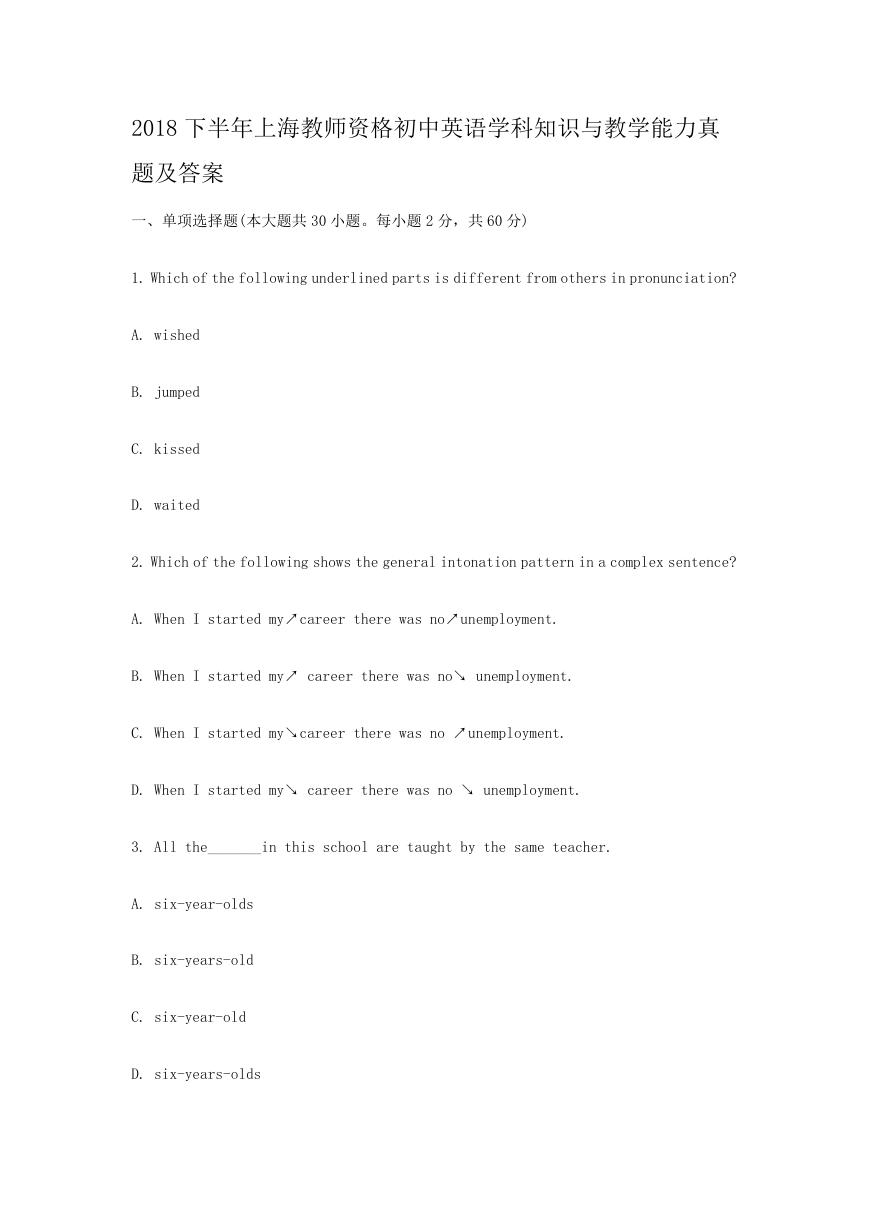
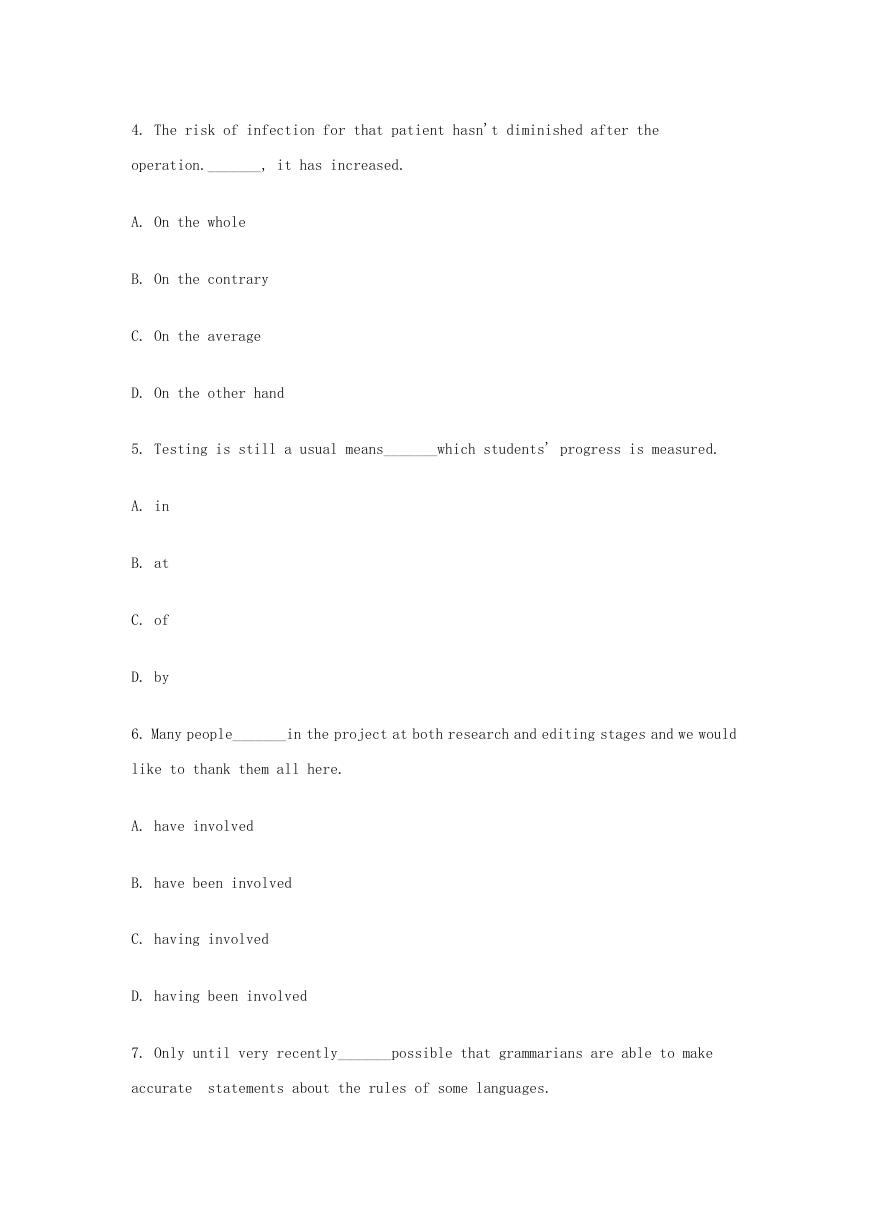
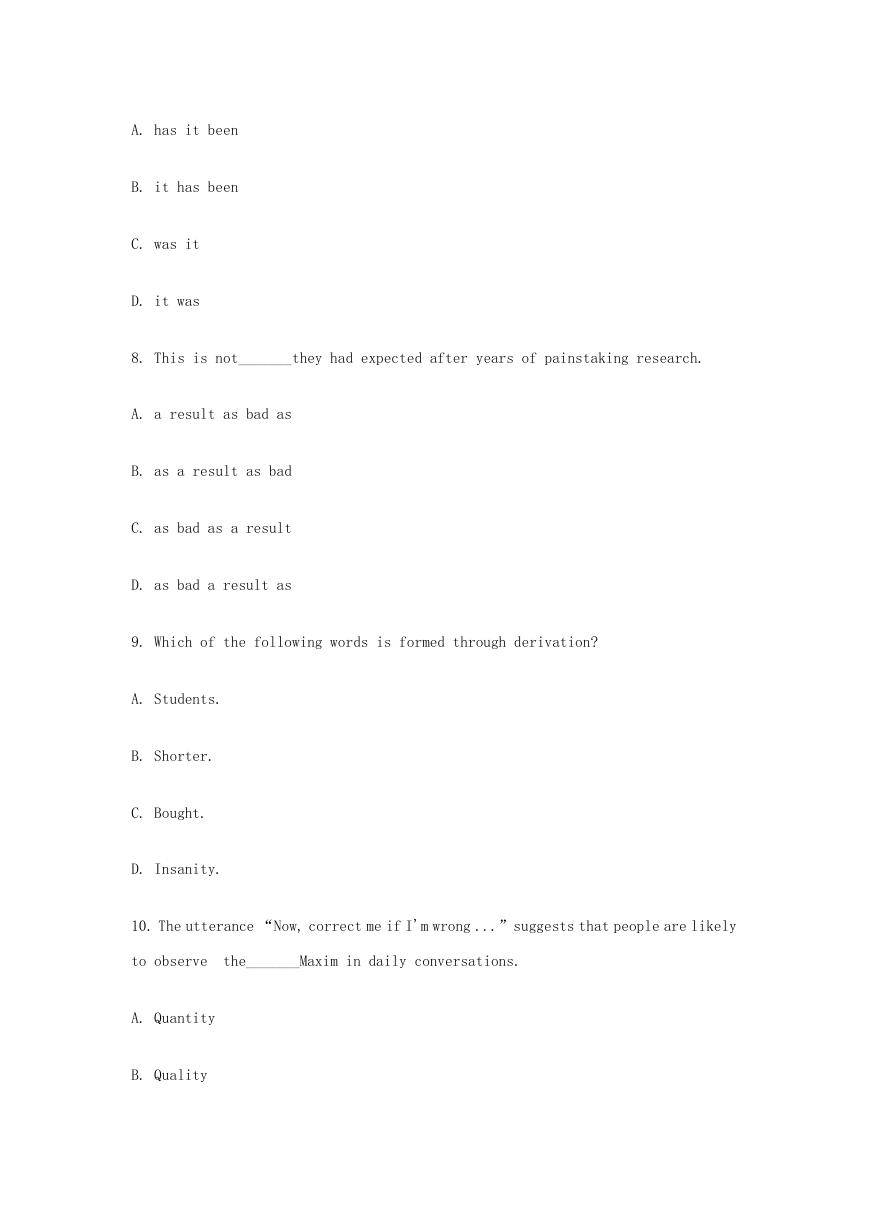
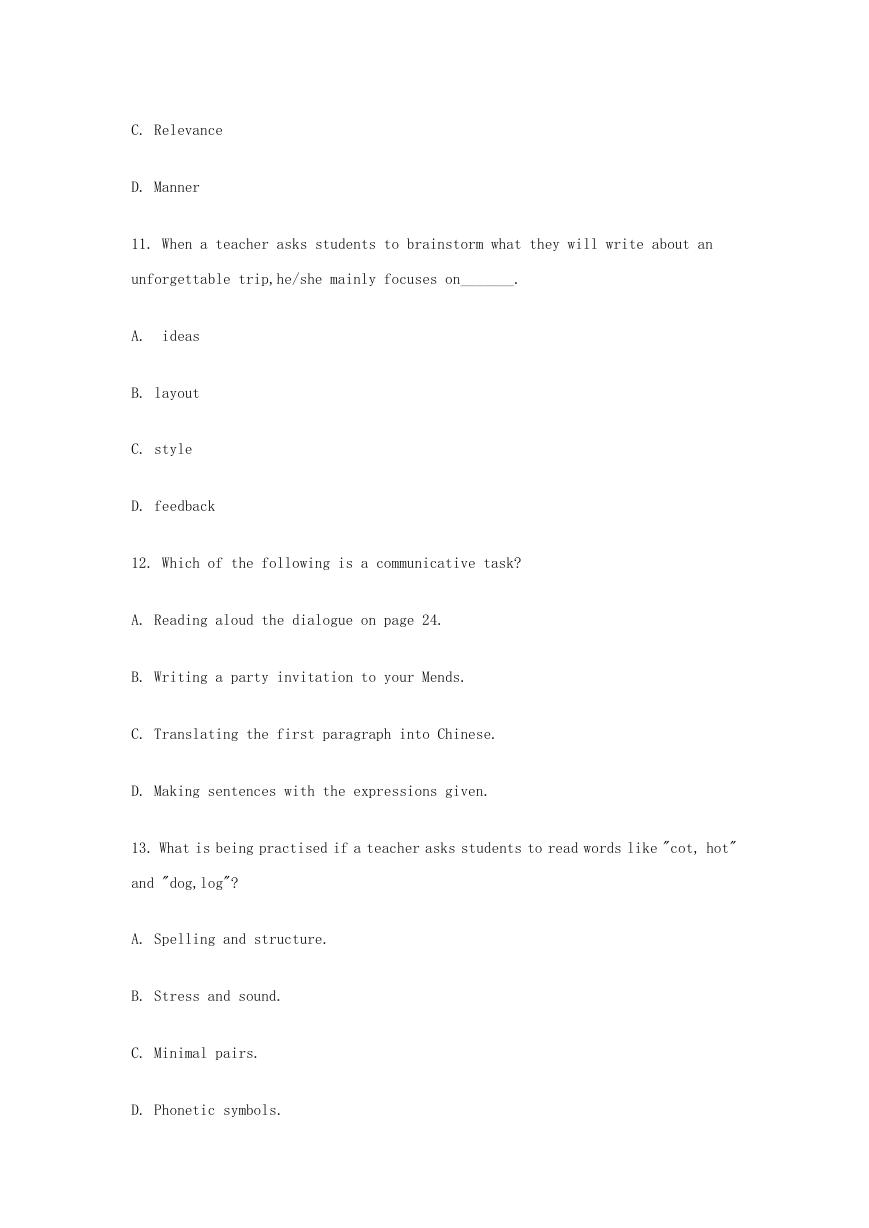
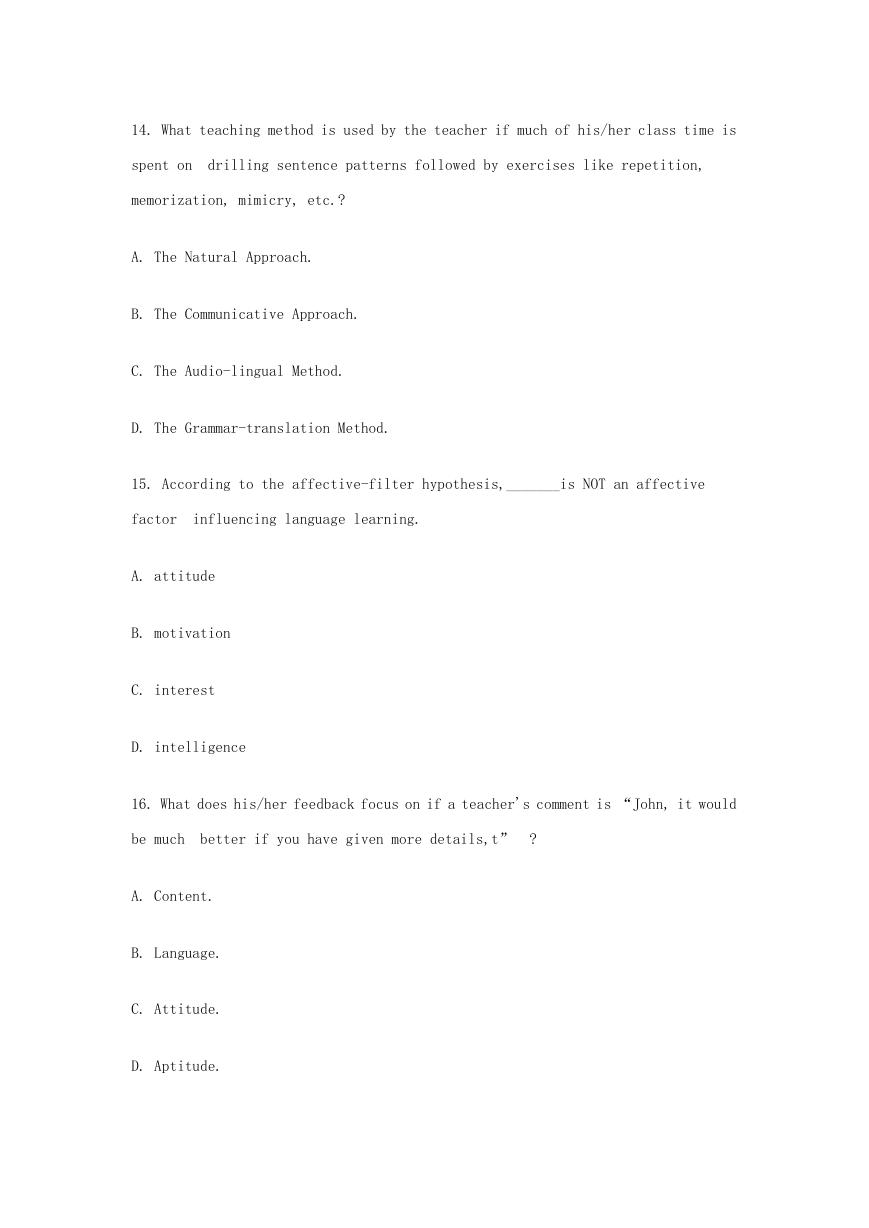
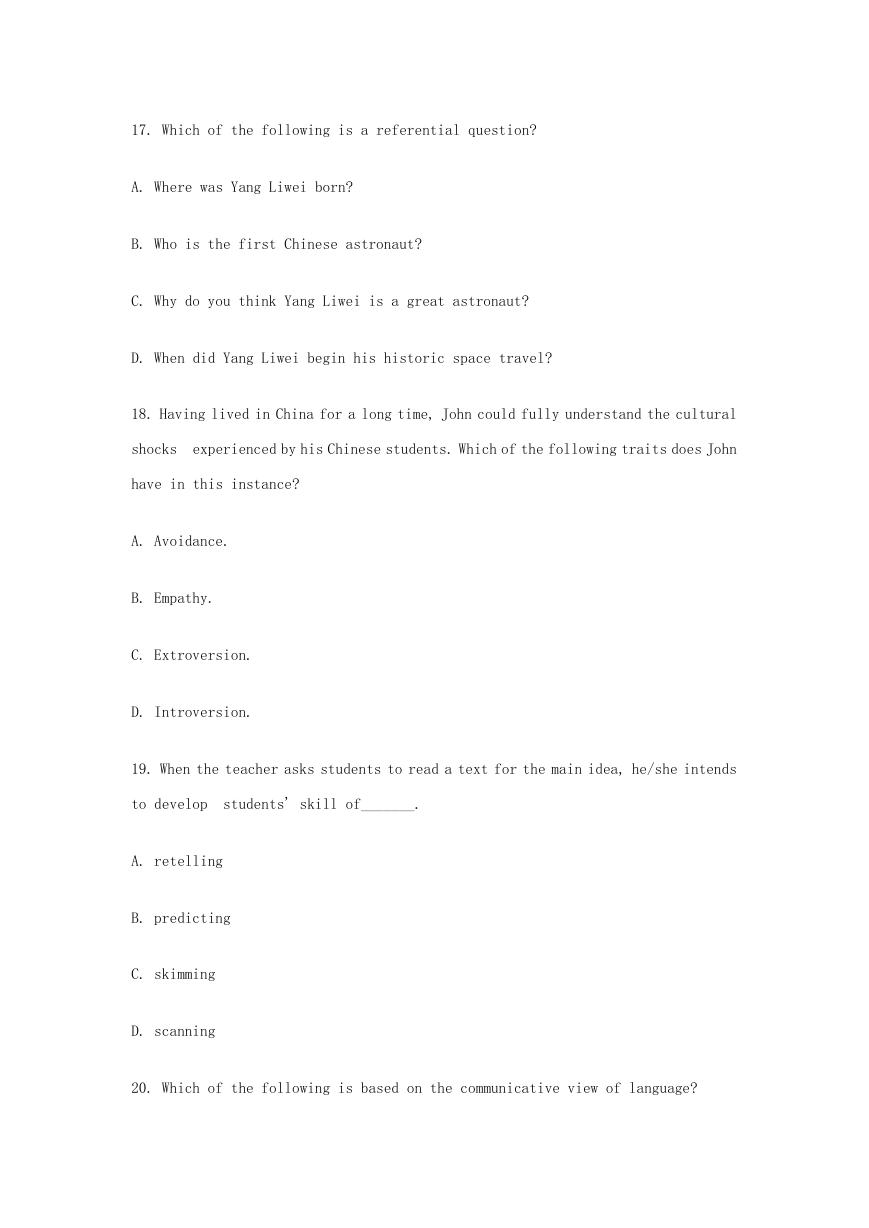
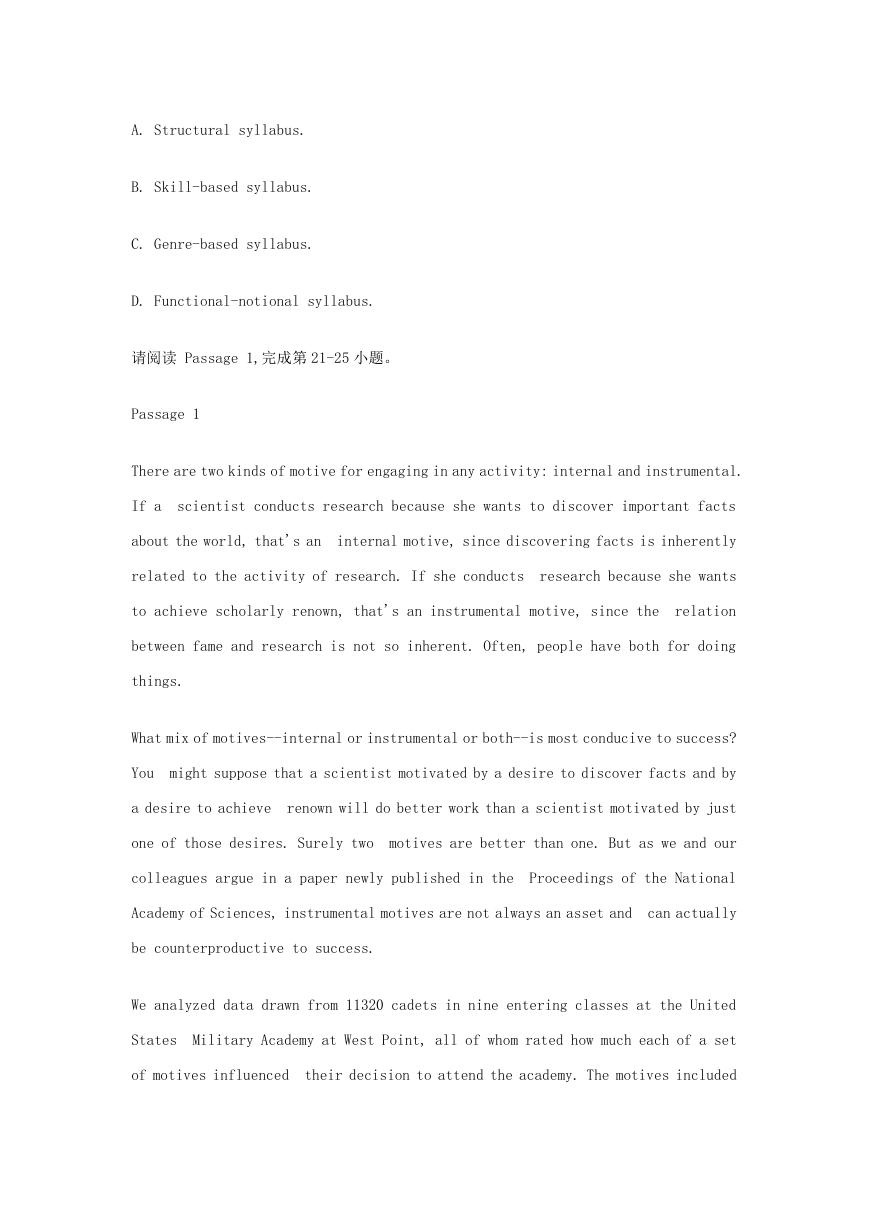
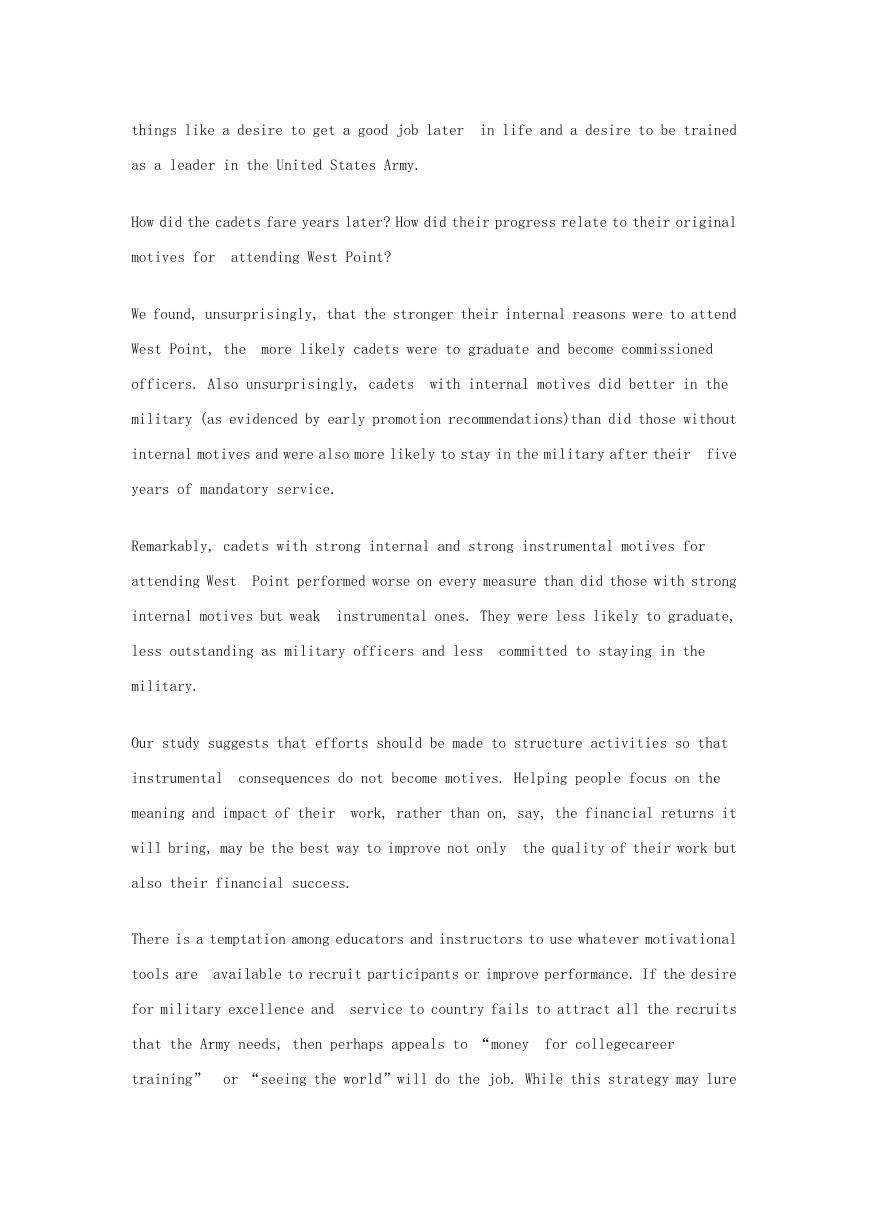








 2023年江西萍乡中考道德与法治真题及答案.doc
2023年江西萍乡中考道德与法治真题及答案.doc 2012年重庆南川中考生物真题及答案.doc
2012年重庆南川中考生物真题及答案.doc 2013年江西师范大学地理学综合及文艺理论基础考研真题.doc
2013年江西师范大学地理学综合及文艺理论基础考研真题.doc 2020年四川甘孜小升初语文真题及答案I卷.doc
2020年四川甘孜小升初语文真题及答案I卷.doc 2020年注册岩土工程师专业基础考试真题及答案.doc
2020年注册岩土工程师专业基础考试真题及答案.doc 2023-2024学年福建省厦门市九年级上学期数学月考试题及答案.doc
2023-2024学年福建省厦门市九年级上学期数学月考试题及答案.doc 2021-2022学年辽宁省沈阳市大东区九年级上学期语文期末试题及答案.doc
2021-2022学年辽宁省沈阳市大东区九年级上学期语文期末试题及答案.doc 2022-2023学年北京东城区初三第一学期物理期末试卷及答案.doc
2022-2023学年北京东城区初三第一学期物理期末试卷及答案.doc 2018上半年江西教师资格初中地理学科知识与教学能力真题及答案.doc
2018上半年江西教师资格初中地理学科知识与教学能力真题及答案.doc 2012年河北国家公务员申论考试真题及答案-省级.doc
2012年河北国家公务员申论考试真题及答案-省级.doc 2020-2021学年江苏省扬州市江都区邵樊片九年级上学期数学第一次质量检测试题及答案.doc
2020-2021学年江苏省扬州市江都区邵樊片九年级上学期数学第一次质量检测试题及答案.doc 2022下半年黑龙江教师资格证中学综合素质真题及答案.doc
2022下半年黑龙江教师资格证中学综合素质真题及答案.doc